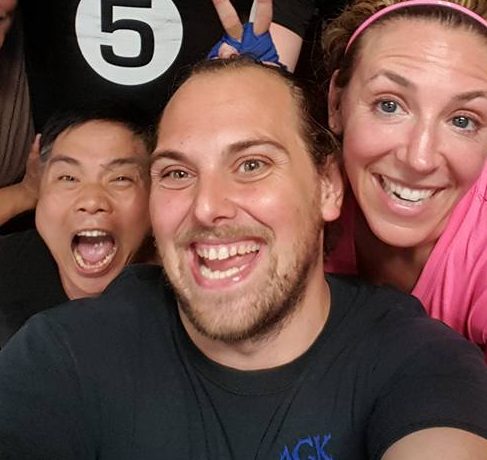Are you tired of your doctor telling you to “exercise more” or “eat healthier” every time you go in for a check-up? We get it. While we all know that taking care of our health is important, actually following through on those good habits can be a challenge. That’s where martial arts training comes in.
How can martial arts training help improve your health and well-being, and what should you keep in mind when starting a new training regimen?
Martial arts training is a fun and engaging way to improve your health and well-being, and doctors across the country are taking notice. From cardiovascular health to stress management, the benefits of martial arts training are numerous and varied. However, as with any new physical activity, it’s important to understand the potential risks and benefits before jumping in.
In this blog post, we’ll explore the top five things your doctor wishes you knew about martial arts training. From improving cardiovascular health to building social connections, these benefits are sure to make you think twice before skipping your next workout. So grab your uniform and get ready to learn how martial arts training at Vision Martial Arts in Patchogue can improve your health and well-being in ways you never thought possible.
Jab Your Way to a Healthier Heart
How Martial Arts Training Can Improve Cardiovascular Health
When it comes to improving your cardiovascular health, most people think of running, cycling, or other forms of traditional aerobic exercise. However, martial arts training can be just as effective – if not more so – at improving your heart health. Here are just a few of the ways that martial arts can benefit your cardiovascular system:
First, martial arts training is a high-intensity form of exercise that can get your heart pumping and your blood flowing. This increased blood flow can help improve circulation, lower blood pressure, and reduce the risk of heart disease. Additionally, the fast-paced, rhythmic movements of martial arts can help strengthen the heart muscle itself, making it more efficient at pumping blood throughout the body.
But martial arts training isn’t just about getting your heart rate up – it’s also about building endurance and stamina. Many martial arts styles involve long, intense training sessions that can challenge your cardiovascular system in new and exciting ways. Whether you’re sparring with a partner, practicing your forms, or hitting the heavy bag, the physical demands of martial arts training can help improve your overall endurance and make everyday activities feel easier.
If you’re new to martial arts training, it’s important to take things slow and gradually build up your cardiovascular endurance. Start by incorporating short bursts of high-intensity activity into your training sessions, such as jumping jacks, squats, or high knees. As you become more comfortable with these movements, you can start to increase the intensity and duration of your workouts.
Remember, the key to improving your cardiovascular health through martial arts training is consistency. By making martial arts a regular part of your exercise routine, you can reap the benefits of improved heart health and enjoy all the other physical and mental benefits that come with this exciting and engaging form of exercise.
Get Strong & Flexible with Martial Arts
How Training Can Benefit Your Muscles
When most people think of martial arts, they think of flashy kicks, lightning-fast strikes, and impressive feats of physical prowess. However, martial arts training is also an excellent way to improve your strength, flexibility, and overall muscular health. Here’s how:
First, martial arts training requires a lot of strength and power. Whether you’re throwing a punch, executing a takedown, or holding a stance, your muscles are constantly working to generate force and maintain stability. This means that regular martial arts training can help build and tone your muscles, improving your overall strength and muscular endurance.
But martial arts training isn’t just about raw power – it’s also about developing flexibility and mobility. Many martial arts styles involve a lot of stretching and dynamic movements that can help improve your range of motion and overall flexibility. This increased flexibility can help reduce the risk of injury, improve athletic performance, and even improve your posture and balance.
If you’re new to martial arts training, it’s important to start slow and gradually build up your strength and flexibility. Focus on basic exercises like push-ups, squats, and lunges to build overall strength, and incorporate stretching and mobility work into your routine to improve your flexibility. As you progress, you can start to incorporate more advanced techniques and movements to challenge your muscles in new and exciting ways.
Remember, the key to improving your strength and flexibility through martial arts training is consistency. By making martial arts a regular part of your exercise routine, you can reap the benefits of improved muscular health and enjoy all the other physical and mental benefits.
Martial Arts for the Mind
How Training Can Benefit Your Mental Health
We all know that exercise is good for our physical health, but did you know that it’s also great for your mental health? In fact, martial arts training has been shown to have a number of benefits for mental health and well-being. Here are just a few of the ways that taking classes at Vision Martial Arts can help reduce stress and improve your mental health:
First, martial arts training can help reduce stress and anxiety. The physical demands of martial arts training can help release tension and stress from the body, while the meditative and focused nature of the practice can help calm the mind and improve mental clarity. Additionally, martial arts training provides a healthy outlet for stress and frustration, allowing you to channel those feelings into something positive and productive.
But the benefits of martial arts training go beyond stress reduction. Regular training has been shown to improve self-esteem and confidence, reduce symptoms of depression, and even improve cognitive function. The challenging nature of martial arts training can help build mental toughness and resilience, which can carry over into all areas of your life.
If you’re new to martial arts training, it’s important to approach it as a tool for mental health and stress management. Set aside time each week to practice, and focus on being present in the moment and fully engaged in your training. Experiment with different techniques and movements to find what works best for you, and don’t be afraid to ask for help or guidance from your instructor or fellow students.
Remember, the key to improving your mental health through martial arts training is consistency and a willingness to be open to the experience. By making martial arts a regular part of your exercise routine, you can reap the benefits of improved mental health and enjoy all the other physical and social benefits that come with this ancient form of exercise.
Stay on Your Feet
How Martial Arts Training Can Improve Your Balance and Coordination
Balance and coordination are two crucial components of overall fitness and health, but they’re often overlooked in traditional exercise programs. However, martial arts training can be an excellent way to improve these skills, which can help reduce the risk of falls and other injuries. Here’s how:
First, martial arts training involves a lot of dynamic movements that require balance and coordination. Whether you’re executing a kick, performing a throw, or engaging in sparring, you need to be able to control your body in space and adjust your movements in real-time. This constant challenge to your balance and coordination can help improve these skills over time, making you more stable and surefooted in all areas of your life.
But the benefits of improved balance and coordination go beyond just avoiding falls. Research has shown that balance and coordination can be strong predictors of overall health and well-being in older adults. In fact, some studies have found that the ability to balance on one leg for more than 20 seconds can be a good indicator of cognitive health and longevity.
If you’re new to martial arts training, it’s important to start with the basics and gradually build up your balance and coordination skills. Focus on standing exercises like one-legged balances, lunges, and squats to improve your stability, and incorporate footwork drills and coordination exercises to improve your agility and control.
Remember, the key to improving your balance and coordination through martial arts training is consistency and patience. Don’t get discouraged if you struggle at first – these skills take time and practice to develop as they incorporate several systems in your body that all have to learn to work together.
Find Your Tribe
How Martial Arts Training Can Build Community and Social Support
Exercise is often considered a solitary pursuit – just you, your workout gear, and the open road. However, martial arts training is different. It’s a social and community-based activity that can provide a sense of belonging, motivation, and support. Here’s how:
First, martial arts training is often done in a group setting, with other students and instructors providing support and encouragement. This sense of camaraderie can help keep you motivated and engaged in your training, even on days when you don’t feel like working out. Additionally, training with others can provide a healthy dose of competition and challenge, pushing you to work harder and achieve more than you would on your own.
But the benefits of martial arts community go beyond just motivation and support. Training with others can help build social connections and relationships, which have been shown to be crucial for overall health and well-being. In fact, studies have found that social isolation and loneliness can be as harmful to health as smoking, obesity, and other risk factors.
It’s important to take advantage of the social and community-based aspects of the practice. Attend classes regularly, introduce yourself to other students and instructors, and participate in group activities and events. Many martial arts schools, including Vision Martial Arts, host activities and events outside of regular classes. Don’t be afraid to ask for help or guidance from others, and offer your own support and encouragement in return.
The key to building community and social support through martial arts training is participation and engagement. By becoming an active member of your martial arts community, you can reap the benefits of improved social connections that come with training alongside positive peers and mentors.
Conclusion
Martial arts training is a powerful tool for improving your physical and mental health, building social connections, and unleashing your inner warrior. Here are the five things that doctors wish you knew about this exciting and rewarding form of exercise:
- Martial arts training can help improve cardiovascular health, building endurance and increasing overall fitness levels.
- Martial arts training can improve strength and flexibility, making you more powerful and agile in all areas of your life.
- Martial arts training can help reduce stress and improve mental clarity, promoting overall mental health and well-being.
- Martial arts training can improve balance and coordination, reducing the risk of falls and other injuries.
- Martial arts training can build a sense of community and social support, providing motivation, inspiration, and a sense of belonging.
However, it’s important to remember that not all forms of martial arts training are suitable for all individuals. Before starting a new training regimen, it’s important to consult with your healthcare provider to ensure that it’s safe and appropriate for your current level of fitness and overall health.
If you’re interested in trying martial arts training, don’t be intimidated – there’s a style and a community out there for everyone. Whether you’re looking for a high-energy workout, a meditative practice, or a social activity to connect with others, martial arts training can help you achieve your goals and unleash your inner warrior. So what are you waiting for? Find a class in your area and start your journey to improved health and well-being today!
To start YOUR martial arts journey, click the button below to enroll in our free 2-week test drive of the program:
Vision Martial Arts
218 Medford Ave
Patchogue, NY 11772
631-707-5610

Author: Michael A Evans
Michael is a 6th-degree black sash under his teacher, Moises Arocho, and has been training in martial arts since 1985. Michael has a degree in Massage Therapy from NY College of Health Professions. He is the co-owner of Vision Martial Arts in Patchogue, NY. Michael is also the editor of Onward Science and a collaborator on the Little Laurie and Ninja Née book series.

















